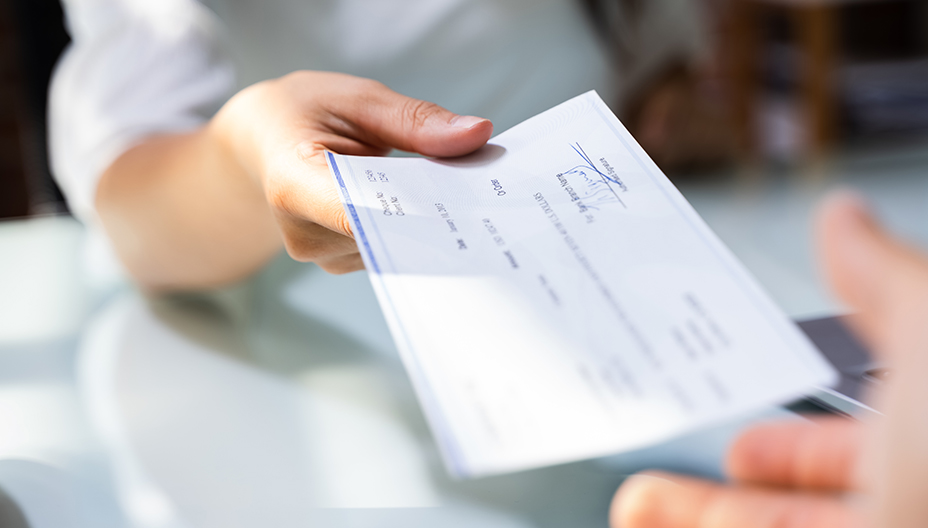Learn
Best Practices for Stress-Free Check Processing

Paper checks are a convenient way to send and receive payments. As a business owner, you’ll want to ensure this payment method is efficient and secure. It is best to establish clear check processing guidelines and consistent procedures upfront.
-
Create a standard check acceptance policy.
Develop a standard set of rules for customers who pay by check. Your policy should address these key points.- The types of checks your business will accept. For example, you may choose not to accept third-party, out-of-state or government checks.
- Required information on preprinted checks. The safest policies include account holder’s name, address and account number displayed on checks the financial institution prints.
- Whether checks will require authorization and identification. Be specific about which forms of ID are required and who will verify and authorize the payment.
- Minimum and maximum amounts for which the checks may be written. The best practice is to allow only the exact purchase amount.
- Fees to assess for returned checks.
Your check acceptance policy must comply with state identification requirements. Requesting a driver’s license or other photo ID at the point of sale is typical. However, some states don’t allow businesses to request credit cards as identification verification when customers pay by check. There may also be additional requirements for requesting, recording or retaining information used to verify identification.
Be sure that all customers and employees are aware of your business’ check acceptance requirements, including how information will be verified and used. -
Train staff to properly accept paper checks and identify potentially fraudulent ones.
When accepting checks, employees should carefully review that information is accurate.- Check that the payer’s name and address are present. Also verify that the check number, as well as routing and account numbers along the check’s bottom are legible.
- Confirm that checks bear the correct date. While it’s legal to accept postdated checks, banks may choose to process them before the date indicated or only honor them within a certain period.
- Ensure that the check is payable to your business, that written and numeric amounts are accurate and that the check is signed.
It is also important that employees can help to prevent check fraud. Obvious signs of fraud might include:- Fonts that don’t match on the preprinted portion of the check.
- Thin or oddly textured paper or no perforated edge.
- The preprinted ink smears when touched.
- The check number is missing from the top and bottom of the check.
-
Choose the best check deposit option for your business.
If your business frequently receives paper checks as payment, it’s best to establish deposit protocols. Determine a schedule for making deposits, responsible parties and security measures they will need to take. Consider varying the schedule and depositors so that your procedures aren’t transparent to would-be criminals. Remote deposit capture, where businesses scan and electronically deposit paper checks, is a faster, safer alternative to physical deliveries.
High-volume check processing may require additional assistance from your financial institution. For example, some banks’ vault services include installing a depository at your location where armed guards can pick up and deliver paper checks to the institution. With lockbox services, customers send payments to a dedicated P.O. address instead of your business. -
Implement a clear-cut returned check policy.
Inevitably you’ll experience checks returned for insufficient funds. To minimize the negative impact to your business, develop a proactive plan to recover the outstanding funds. You might start with a call to the customer to alert them that the check was returned and to ask how they will pay. Before calling, however, consult state laws governing debt collection which could prohibit calls during certain times or restrict what you can say when speaking with the customer.
If you are unable to resolve the issue by phone, sending a collection letter would be the logical next step or your bank may be able to assist with a check recovery solution. In some cases, it might be necessary to forward the case to a collection agency or pursue action in a small claims court. Be prepared to offer supporting documentation, especially if fraud is involved.
If you’d like to streamline check processing or you’re interested in automated payables and receivables, we can help. Call 1-888-SYNOVUS (1-888-796-6887) or stop by one of our local branches.
Important Disclosure Information
This content is general in nature and does not constitute legal, tax, accounting, financial or investment advice. You are encouraged to consult with competent legal, tax, accounting, financial or investment professionals based on your specific circumstances. We do not make any warranties as to accuracy or completeness of this information, do not endorse any third-party companies, products, or services described here, and take no liability for your use of this information. Diversification does not ensure against loss.
Do you have questions or ideas?
Share your thoughts about this article or suggest a topic for a new one
